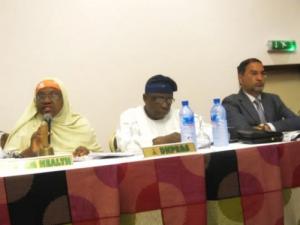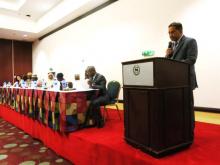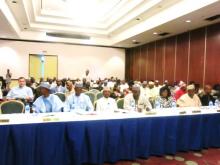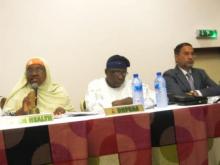Nigeria develops new National Health Policy to accommodate emerging trends
Abuja, 22 June 2016 - Finalization of the National Health Policy revised for the attainment of Universal Health Coverage (UCH) and other health-related Sustainable Development Goals (SDGs) has ended in Abuja.
Chairing a stakeholders meeting on the National Health Policy in Abuja on 18 June, 2016, the Minister of Health, represented by the Permanent Secretary in the Federal Ministry of Health (FMOH), Dr Amina SHamaki stated that prior to the development of the current National Health Policy document, Nigeria had developed and implemented two others in 1988 and 2004. Both were developed at critical stages in the evolution of the Nigeria Health System and had far reaching impact on improving the performance of the system over the course of their lifetime.
However, the Minister noted that over the last two (2) and a half decades, Nigeria has recorded some progress in the performance of its health system. This includes improvements in key indices for ‘major’ communicable diseases (HIV/AIDS, TB and Malaria), as well as maternal and child health. Recently, Nigeria has been able to among others, interrupt the transmission of wild poliovirus, eradicate the Guinea-worm disease and successfully contain the spread of the deadly Ebola virus disease.
“The key lesson from these successes is the need for the country to build a resilient health system that assures access to basic health care services in a sustainable manner” the Minister noted. Additionally, he assured of a good foundation and that Nigeria is in the right direction as the country earnestly seeks to achieve the visionary goal of UHC.
In his submission, the WHO Country Representative (WR) Dr Rui Gama Vaz said that he is inspired by Nigeria’s commitment towards achievement of UHC through Primary Healthcare (PHC) but stated that the citizenry deserves to receive quality and equitable health services without financial and other barriers.
According to Dr Vaz, “this undertaking requires institution of core health system elements that include comprehensive and coherent health sector policies, established and sustained integrated ward/local health services with active community engagement, strengthened mechanisms which remove geographic, social and financial barriers that impede access to care and improved information for decision making, at the national, sub-regional, and regional levels”. He added that detailed plans and investments to expand and retain human resources for health across the states, with appropriate skills mix and competences are imperative to providing quality health services.
The WR further observed that the attainment of UHC, requires investment in the health sector by governments and health partners which have not been optimal across the region.
He noted that only eight (8) countries have attained the Abuja Declaration target of allocating 15% of national budgets to the health sector and in 77% of Member States, out-of-pocket payments by patients remain higher than 20% of total health expenditure - a level which indicates the existence of financial barriers to accessing services. With approximately 70% out of pocket expenditures in Nigeria, UHC through PHC that includes public sector funding, initiates the much needed financial protection especially for the poor.
The technical working group session was chaired by Professor Eyitayo Lambo with active participation of officials of the Federal Ministry of Health, all Commissioners for Health and development partners.
________________________________________
For more information, please contact:
Technical contact:
Dr Teniin Gakuruh; Tel: +234 803 979 5149; Email: %20gakuruht [at] who.int (gakuruht[at]who[dot]int)
Media contact:
Ms Charity Warigon; Tel: +234 810 221 0093; Email: %20warigonc [at] who.int (warigonc[at]who[dot]int)
Below:
01. (L-R) Dr Shamaki, Professor Lambo and Dr Vaz at the stakeholders meeting in Abuja
02. Dr Vaz delivering his speech
03. Participants at the meeting






